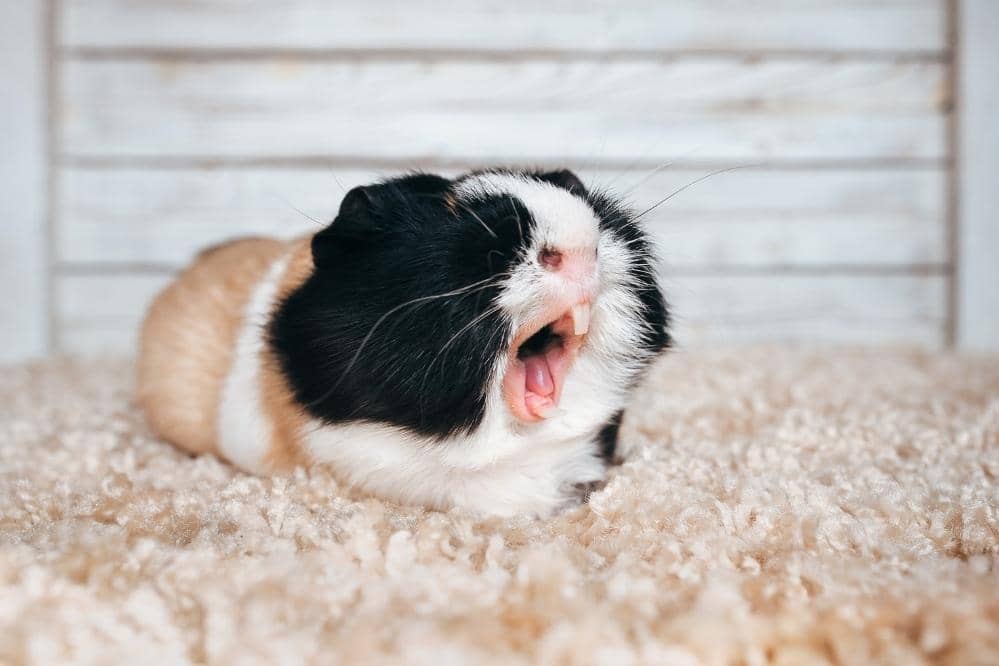Today, we’ll introduce you to guinea pigs, who, once they’ve developed confidence, are incredibly pleasant and social rodents.
They’re hesitant and skittish at first. This is because, in the wild, they are frequently victim to a variety of predators.
Their natural fear of the unknown is tremendous, so it’s understandable that they’d want to hide when we’re trying to hold them.
Improper Handling
Veterinarians regularly deal with numerous cases involving errors in the care of various exotic animals, including guinea pigs. To avoid these errors, which can endanger their welfare, the first thing to do is to detect them.
Errors in guinea pig care can cover multiple aspects, such as feeding, habitat, substrate or hygiene. In order to improve our relationship, we must learn what do guinea pigs hate.
9 Things Guinea pig hate
1- Let them sleep in peace
As we said, guinea pigs are a sociable species and like to enjoy periods of rest throughout the day, so they will take more than one nap, so do not wake them up if you see that they sleep a lot!
This is totally normal for them. Waking them up puts them in a very bad mood, and you will notice this instantaneously.
2- Restraining their freedom
Guinea pigs lick or softly suck the skin of our hand, arm, or even foot on a regular basis. These suctions, which seem like nibbles, are actually affectionate gestures. In addition, guinea pigs are known to gnaw on their feet or shoes.
You’ll realize that she wants to play with you, ask for food, or attract your attention by the way she does it. This is how you’ll know if your guinea pig is happy.
If your guinea pig is biting at your skin with her teeth, it might indicate that she isn’t completely at ease. Guinea pigs want to run and move around freely, so holding them in your arms does not make them feel comfortable and it’s actually something that guinea pigs hate.
What you may consider an affectionate gesture or a game is a source of worry for her. In these cases she is just letting you know that she does not feel comfortable.
3- You pressure your guinea pig to trust you
Something that not only guinea pigs hate, but also all of us, is unnecessary pressure on trust issues.
When a guinea pig allows herself to be carried, it is precisely because you are a trustworthy and protective figure for her, as it is a fearful and timid animal.
You should not be in a rush for this to happen, as you should not be for anything else. It’s great to give her some space and time. If you try to force her, she will see the pressure as a threat, and you will become a threat to her.
Every time you try to carry them by force, you are only becoming a hateful entity for them.
4- The stress of not being able to see their surroundings
It’s critical to keep track of your guinea pig’s movements. They occasionally do little hops that resemble headbutts, depending on their posture and where they are at the time.
Popcorning is the name given to these tiny hops that mimic the hops produced when corn pops into popcorn.
Guinea pigs frequently make these small pops in and out of their cages, as well as when you carry them in your arms. This is an obvious indication of happiness.
It indicates that your guinea pig is content and at peace in his or her surroundings.
On the other hand, you should be aware that guinea pigs, like other animals, feel powerless when their vision is lost. As a result, you should be cautious when petting them.
Sometimes you may inadvertently cover their eyes, a situation that causes them stress and may cause them to head-butt you, as if trying to move your hands away from their eyes, as a signal of something that guinea pigs hate.
5- Guinea pigs hate when you don’t pet them correctly, really!
If you stroke their hair in the opposite way, they will instantaneously hate it and will head-butt you as a result.
Animals, particularly guinea pigs, hate having their hair rubbed in the other direction. This is why petting guinea pigs with swirls, which are relatively popular, is so difficult.
6- An enraged guinea pig makes an enraged noise
You may know your guinea pig likes you when it appreciates your touch and produces a distinct sound that shows happiness.
It’s a short, high-pitched, intermittent whine accompanied with a purr that’s easy to distinguish. If you’re curious, try softly caressing your guinea pig between the ears.
However, what happens when she is not happy with what you do? Quite the opposite.
Your guinea pig will not only show her displeasure, but also her hatred with a long and constant, almost desperate squeaking, which you have to avoid at all costs, because her health is affected.
7- Keeping them in a cage for an extended period of time
To begin with, guinea pigs should not be kept in tiny cages. These animals thrive in large confines. For a pair of guinea pigs, a habitat of roughly 2 m2 is recommended.
Second, guinea pigs cannot be kept in a cage all day or subjected to extremes of temperature, either hot or cold. They, like rabbits, require a few hours of unrestricted running in the sun each day.
They’ll also require a den inside their cage for when they need to hide.
8- Excessive bathing
We know that sometimes we want our pets to have the best possible cleanliness and to always be impeccable, but we don’t take into account that they are not like us, and that maybe subjecting them to all those chemicals makes them hate us.
Yes, guinea pigs should be bathed, but only when necessary, as they are very clean animals by themselves. Be careful never to wet their heads or ears, and of course, always use a specific shampoo for rodents.
9- Guinea Pigs don’t like that much other species
It is not a good idea to house guinea pigs with other species, such as chinchillas, rabbits, etc.
Although they are friendly and relatively calm animals, guinea pigs hate having to adapt to the requirements or tastes of other species and this can lead to unnecessary conflicts.
If you want a companion for your guinea pig, make sure it is of the same species and a relatively similar age to avoid incidents.

